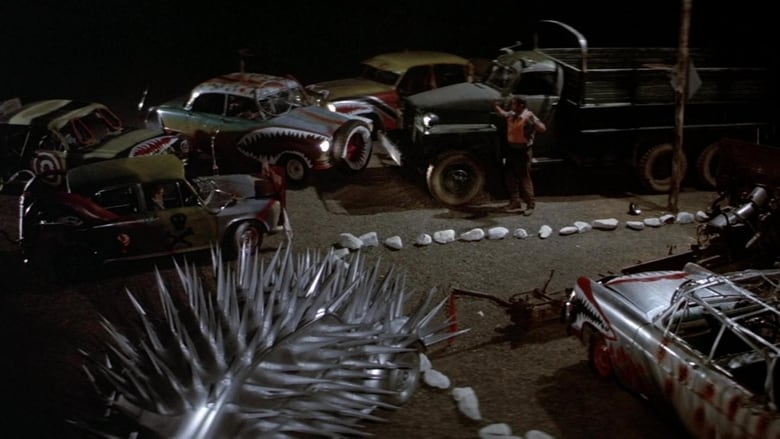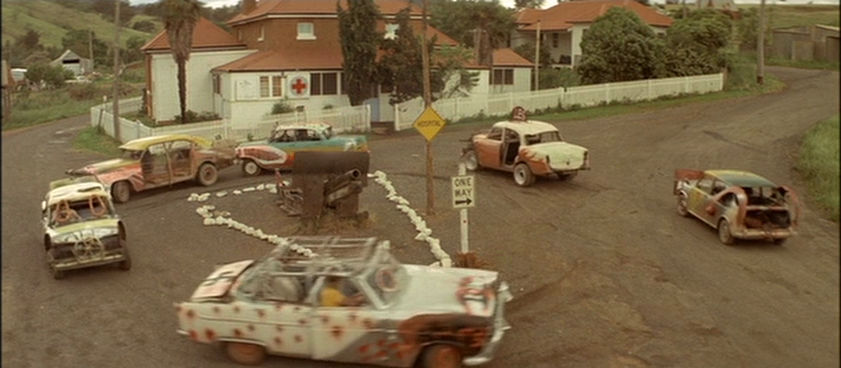← Back to Reviews

in
#717 - The Cars That Ate Paris
Peter Weir, 1974

After surviving a car crash, a man is stranded in a small Australian town where the citizens have a dangerous scheme involving traveling motorists.
Before going on to direct not only two of the greatest Australian films ever made but also a number of highly-acclaimed Hollywood dramas, Peter Weir made one very weird little film called The Cars That Ate Paris. On the surface, it has all the hallmarks of an exploitation film; it focuses on the eponymous Australian town where the eccentric population deliberately causes car crashes and salvages what they can from the wrecks. The film begins with a pair of brothers being involved in such a crash, but only one of them survives. After he recovers, he is encouraged to stay in town by the locals (especially the mayor, who houses him while he adjusts to the situation) and cannot bring himself to leave due to his own traumatic history when it comes to driving cars. The town itself has its own problem as a gang of young car nuts get into a series of escalating conflicts with the peaceful (albeit still ruthlessly homicidal) citizenry.
While this film does have a seemingly typical exploitation premise comparable to Herschell Gordon Lewis's Two Thousand Maniacs! in its tale of insidious small-town folks ritualistically murdering outsiders, in the hands of Weir it becomes something else. It's definitely not focused on the cheap thrills provided by its potentially violent concept (though it does have its fair few scenes of blood and nastiness, especially during its destructively anarchic climax), instead taking the sort of slow-burning meditative route that has characterised just about every Weir film I've seen. One can easily see this as a warm-up for Picnic at Hanging Rock, which also took a normally sensationalised subject and created a film that was more haunting than shocking. Of course, this does mean that The Cars That Ate Paris sometimes feels a bit too slow and restrained for its own good as it follows one survivor's attempts to either escape from or acclimatise to the town's weirdness. It does indulge its simple exploitation-like premise from time to time, but not enough to make it feel like much more than a rough draft for Weir's more amazing films.
Peter Weir, 1974

After surviving a car crash, a man is stranded in a small Australian town where the citizens have a dangerous scheme involving traveling motorists.
Before going on to direct not only two of the greatest Australian films ever made but also a number of highly-acclaimed Hollywood dramas, Peter Weir made one very weird little film called The Cars That Ate Paris. On the surface, it has all the hallmarks of an exploitation film; it focuses on the eponymous Australian town where the eccentric population deliberately causes car crashes and salvages what they can from the wrecks. The film begins with a pair of brothers being involved in such a crash, but only one of them survives. After he recovers, he is encouraged to stay in town by the locals (especially the mayor, who houses him while he adjusts to the situation) and cannot bring himself to leave due to his own traumatic history when it comes to driving cars. The town itself has its own problem as a gang of young car nuts get into a series of escalating conflicts with the peaceful (albeit still ruthlessly homicidal) citizenry.
While this film does have a seemingly typical exploitation premise comparable to Herschell Gordon Lewis's Two Thousand Maniacs! in its tale of insidious small-town folks ritualistically murdering outsiders, in the hands of Weir it becomes something else. It's definitely not focused on the cheap thrills provided by its potentially violent concept (though it does have its fair few scenes of blood and nastiness, especially during its destructively anarchic climax), instead taking the sort of slow-burning meditative route that has characterised just about every Weir film I've seen. One can easily see this as a warm-up for Picnic at Hanging Rock, which also took a normally sensationalised subject and created a film that was more haunting than shocking. Of course, this does mean that The Cars That Ate Paris sometimes feels a bit too slow and restrained for its own good as it follows one survivor's attempts to either escape from or acclimatise to the town's weirdness. It does indulge its simple exploitation-like premise from time to time, but not enough to make it feel like much more than a rough draft for Weir's more amazing films.
